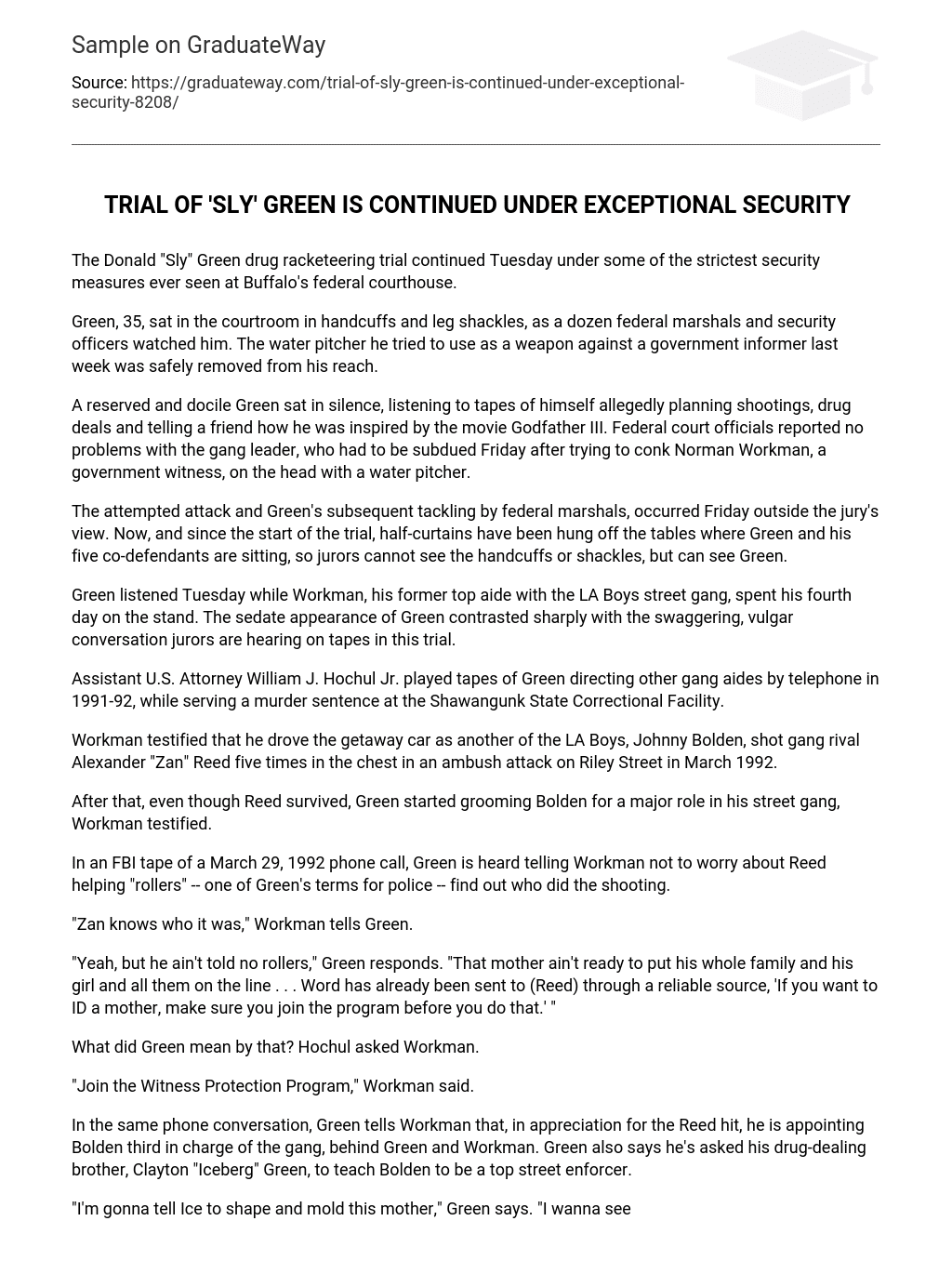The Donald “Sly” Green drug racketeering trial continued Tuesday under some of the strictest security measures ever seen at Buffalo’s federal courthouse.
Green, 35, sat in the courtroom in handcuffs and leg shackles, as a dozen federal marshals and security officers watched him. The water pitcher he tried to use as a weapon against a government informer last week was safely removed from his reach.
A reserved and docile Green sat in silence, listening to tapes of himself allegedly planning shootings, drug deals and telling a friend how he was inspired by the movie Godfather III. Federal court officials reported no problems with the gang leader, who had to be subdued Friday after trying to conk Norman Workman, a government witness, on the head with a water pitcher.
The attempted attack and Green’s subsequent tackling by federal marshals, occurred Friday outside the jury’s view. Now, and since the start of the trial, half-curtains have been hung off the tables where Green and his five co-defendants are sitting, so jurors cannot see the handcuffs or shackles, but can see Green.
Green listened Tuesday while Workman, his former top aide with the LA Boys street gang, spent his fourth day on the stand. The sedate appearance of Green contrasted sharply with the swaggering, vulgar conversation jurors are hearing on tapes in this trial.
Assistant U.S. Attorney William J. Hochul Jr. played tapes of Green directing other gang aides by telephone in 1991-92, while serving a murder sentence at the Shawangunk State Correctional Facility.
Workman testified that he drove the getaway car as another of the LA Boys, Johnny Bolden, shot gang rival Alexander “Zan” Reed five times in the chest in an ambush attack on Riley Street in March 1992.
After that, even though Reed survived, Green started grooming Bolden for a major role in his street gang, Workman testified.
In an FBI tape of a March 29, 1992 phone call, Green is heard telling Workman not to worry about Reed helping “rollers” — one of Green’s terms for police — find out who did the shooting.
“Zan knows who it was,” Workman tells Green.
“Yeah, but he ain’t told no rollers,” Green responds. “That mother ain’t ready to put his whole family and his girl and all them on the line . . . Word has already been sent to (Reed) through a reliable source, ‘If you want to ID a mother, make sure you join the program before you do that.’ ”
What did Green mean by that? Hochul asked Workman.
“Join the Witness Protection Program,” Workman said.
In the same phone conversation, Green tells Workman that, in appreciation for the Reed hit, he is appointing Bolden third in charge of the gang, behind Green and Workman. Green also says he’s asked his drug-dealing brother, Clayton “Iceberg” Green, to teach Bolden to be a top street enforcer.
“I’m gonna tell Ice to shape and mold this mother,” Green says. “I wanna see Johnny have the cars and money . . . We can’t let the (man) down. We gotta do something spectacular, something to show our appreciation and concern.”
Reed, the victim of the ambush, was convicted last week of forcing his way into a Roehrer Avenue drug house and murdering three people with gunfire in 1993.
Bolden, who pleaded guilty to dealing drugs with Green, will testify later in the Green trial.
Jurors Tuesday also heard Green and one of his five co-defendants in this trial, Derwin “DD” Rogers, having several conversations about the drug business. The two haggle about prices, and Green assures Rogers that the price he is charging him is the best in town.
“Listen to this,” Green tells Rogers in a May 9, 1991 tape. “We could make, me and you right now, could make a million dollars in 90 days.”
U.S. Marshal Daniel B. Wright said the leg shackles and other security measures for Green were instituted as a result of Green’s attempted attack on Workman last week. He said marshals have been brought into Buffalo from other cities for the trial.
“It’s a very sensitive trial, with a lot of spectators,” Wright said. “We have a lot of security concerns.”
In his questioning of Workman, Terry Granger, one of Green’s two attorneys, got the government witness to admit that, when first questioned by FBI agents and in front of a grand jury, he lied about some incidents.
When asked why he lied back then, Workman said: “I didn’t want to tell on all my friends and put myself more deeper in the conspiracy.”
Workman said he sold about $200,000 worth of drugs for the LA Boys in 1991-92.





